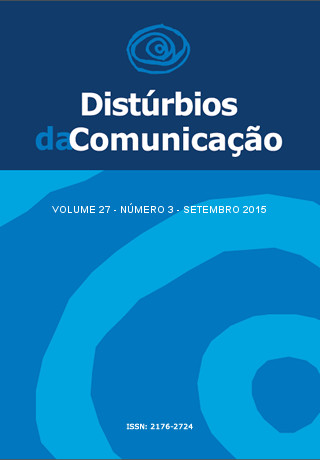Utilização de questionário no monitoramento dos resultados do treinamento auditivo
Palavras-chave:
Fonoaudiologia, Audição, Transtornos da Audição, Percepção Auditiva.Resumo
Introdução: Durante o treinamento auditivo de um indivíduo, é importante obter informações sobre seu comportamento auditivo no cotidiano. Objetivo: Monitorar o comportamento auditivo por meio do uso do Fisher's auditory problems checklist em indivíduos diagnosticados com distúrbio do processamento auditivo, que realizaram treinamento auditivo. Métodos: Participaram 19 indivíduos, com idade entre 12 a 15 anos. Estes indivíduos foram submetidos individualmente a treinamento auditivo de escuta dicótica, baseado no Dichotic Interaural Intensity Difference, proposto por Frank Musiek e organizado em oito sessões, com duração de 50 minutos cada. Os participantes foram distribuídos em grupos, de acordo com as alterações funcionais em atenção seletiva; em processamento temporal; ou em ambos os processos auditivos avaliados. Metade de cada grupo recebeu intervenção de uma vez por semana e a outra metade, duas vezes por semana. O questionário utilizado para monitorar o treinamento auditivo apresenta 24 questões, que fornecem dados sobre o comportamento auditivo do indivíduo. O pai ou o responsável foi orientado a responder cada questão lida pela avaliadora, marcando com um “X” as queixas percebidas em três momentos: pré, metade e pós-intervenção. Resultados: Houve diferença estatística no escore total em todos os grupos, e diminuição da pontuação sobre as queixas na metade do treino e também no final. Com relação à frequência das sessões, não houve diferença entre os grupos, tendo as queixas diminuído, com pontuação similar. Conclusão: O questionário pode ser usado para monitorar o comportamento auditivo durante uma intervenção.
Downloads
Métricas
Downloads
Publicado
Edição
Seção
Licença
Copyright (c) 2015 Liliane Desgualdo Pereira

Este trabalho está licenciado sob uma licença Creative Commons Attribution 4.0 International License.









